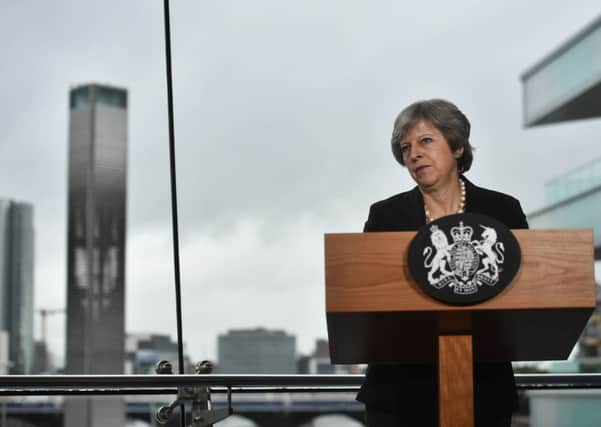The PM was wrong to say the 1998 Belfast Agreement requires a seamless border


Defending her Chequers plan for leaving the EU, the prime minister claimed that anything that undermines a ‘seamless border’ on the island of Ireland, is a “breach of the spirit of the Belfast Agreement”.
That’s an odd statement, that seems to strengthen the position of those who are intent upon using Northern Ireland to derail Brexit. References to the ‘spirit’ or ‘context’ of the agreement, rather than its text, are usually the preserve of Irish nationalists, the Dublin government and hardline remainers. Accepting this kind of language raises all sorts of difficulties for Mrs May and it risks weakening the Union that she wants to defend.
Advertisement
Hide AdAdvertisement
Hide AdAdmittedly, some people in Northern Ireland seem to positively relish the fact that we’re viewed as the Gordian Knot that has to be unpicked for Brexit to proceed. Irish republicans are excited by the idea that any turmoil can be used to promote their goal of an all-island state, while the DUP revels in its new-found relevance at Westminster.
In reality, it’s dangerous - for unionists in particular - to be at the centre of this struggle.
With all these big political beasts stomping excitedly about, nostrils aflame, pawing the ground and occasionally charging at each other, it would be quite easy for little Northern Ireland to get badly gored or even trampled underfoot.
The latest batch of amendments to the EU Withdrawal Bill, which inflamed an ongoing civil war within the Conservative Party, included a provision that Northern Ireland cannot lawfully form “part of a separate customs territory to Great Britain”.
Advertisement
Hide AdAdvertisement
Hide AdThat amendment rules out creating an internal customs border, but it doesn’t address Brussels’ threat that Northern Ireland must remain in the single market while the rest of the country leaves. Theresa May says this problem will be solved if the UK adopts a ‘common rulebook’ with the EU for goods and agriculture.
Despite the fury of some of its opponents, her Chequers proposals and the resulting white paper look like the outline of a pragmatic Brexit compromise. From the beginning, all the most powerful arguments for leaving the Union were around sovereignty and Britain’s refusal to be part of a political project that has taken on the trappings of a European super-state.
A ‘common rulebook’ isn’t ideal, but the realities of international trade always meant that the UK was likely to share standards with the single market, for large areas of the economy at least. May’s customs compromise looks the messiest part of the paper, but it shows that Britain is prepared to think creatively, in order to achieve ‘seamless’ borders. The freedom of EU citizens to move to the UK to work was never as controversial as the freedoms to use services or claim benefits automatically.
While all of these points are defensible separately, Mrs May is quite wrong to imply that this form of Brexit is needed because of the Good Friday Agreement or the commitments Britain undertook in December as part of its ‘joint report’ with the EU Commission. It’s also a risky strategy.
Advertisement
Hide AdAdvertisement
Hide AdWhen Ben Bradley resigned as the Tory party’s vice-chair, he cited as one of his main concerns, “the decision to accept the backstop arrangements for Northern Ireland” from December’s agreement.
His statement demonstrated a common tendency to conflate the ‘joint report’ backstop, which was mutually agreed, with the commission’s subsequent version, published in March, that distorted the original text beyond recognition.
Paragraph 49 of the December document promised that, if there was no agreement on a trade deal or specific solutions for Ireland, “the United Kingdom will maintain full alignment with those rules of the Internal Market and the Customs Union which, now or in the future, support North-South cooperation, the all-island economy and the protection of the 1998 Agreement”. Paragraph 50 expressly rules out “new regulatory barriers….. between Northern Ireland and the rest of the United Kingdom”, unless the Stormont Assembly legislates to introduce “distinct arrangements”.
By March, the Commission had translated these commitments into a ‘legal text’ that established a ‘common regulatory area’ on the island of Ireland, with Northern Ireland effectively staying in the single market and customs union, while the rest of the UK left.
Advertisement
Hide AdAdvertisement
Hide AdThis interpretation was outrageous, but it was facilitated by Conservative ambivalence toward the joint report, after it became clear that even limited UK-wide alignment would prove unpalatable to hardcore Brexiteers.
Perhaps, had the government tried to firm up the areas where alignment would be necessary more quickly, the EU would have had less latitude to corrupt paragraphs 49 and 50.
There is a risk that, having been at the heart of the knottiest disagreements between the UK and the EU, Northern Ireland will also become the rope in a tug-of-war between factions of the Conservative Party. If Theresa May accepts, wrongly, that a soft Brexit is required to protect the Belfast Agreement and prevent a border in the Irish Sea, ultra-Brexiteers may feel that it is still worth considering special arrangements for the province, in order to secure a harder Brexit.
In this new context, Boris Johnson’s statement that “it’s beyond belief that we’re allowing the (Northern Irish) tail to wag the dog”, becomes a chilling warning for Ulster unionists.
Advertisement
Hide AdAdvertisement
Hide AdNeither the Belfast Agreement nor the wider peace process prevents Northern Ireland from being included in any type of Brexit, no matter how hard; though a version that offers a softer border would make life simpler here and minimise any potential disruption. Likewise, while the EU’s warped take on the backstop arrangement creates serious problems for the government, the text agreed in December forms no impediment to a sensible deal.
The Chequers’ proposals must stand on their own merit. Both Mrs May and the harder-nosed Brexiteers should stop using Northern Ireland as an excuse.